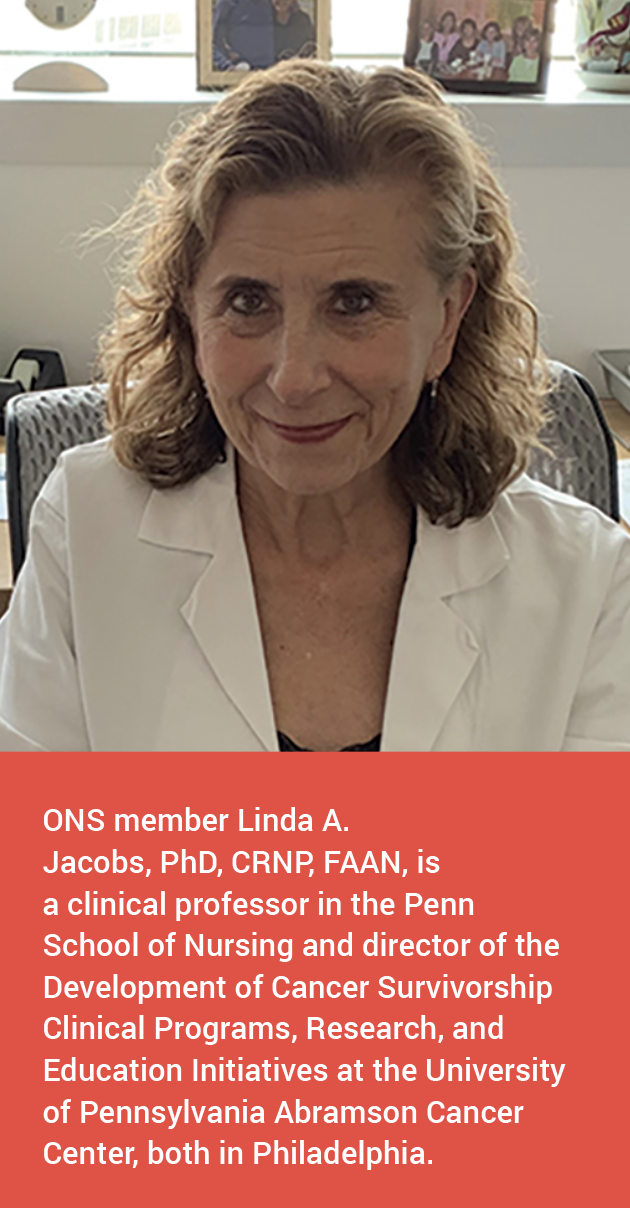Nurse Scientists Are Leading Patient Care Discoveries in the Ever-Evolving World of Cancer Survivorship
The cancer survivorship program team at the University of Pennsylvania Abramson Cancer Center is conducting numerous research projects such as cancer treatment’s late effects, survivors’ quality of life and health behaviors, telemedicine for survivorship visits, and even an artificial intelligence–powered, mobile phone–based program to support patient adherence to guidance from survivorship visits.

In 2017, I coauthored a review that outlined the challenges of and proposed solutions for follow-up survivorship care. We identified four facets in need of reform (https://doi.org/10.1016/S1470-2045(16)30386-2): provision, coordination, workforce shortage, and cost and quality. Our recommended solutions included implementation of electronic survivorship care plans and clinical pathways (e.g., care pathways, integrated care pathways, care maps) and widespread use of advanced practice providers (e.g., nurse practitioners, physician assistants) to expand the workforce.
Early in the pandemic, the world rapidly shifted to virtual platforms. Changes in clinical care delivery occurred quickly and it was unclear whether virtual visits were appropriately meeting patients’ needs, so our team began investigating survivorship care delivery (https://umncpd.cloud-cme.com/course/courseoverview?P=0&EID=279) in the COVID-19 climate. We measured patients’ satisfaction with telehealth (https://umncpd.cloud-cme.com/course/courseoverview?P=0&EID=279) visits via a survey among survivors of adolescent/young adult, testicular, prostate, and breast cancer who were seen for a cancer survivorship or follow-up visit via telemedicine. Our findings demonstrated that 74% of respondents reported that telemedicine visits exceeded expectations and 82% were satisfied; however, only 46% indicated that telemedicine was “as good as” a traditional in-person visit. We concluded that telemedicine is generally accepted (https://umncpd.cloud-cme.com/course/courseoverview?P=0&EID=279) and that it has value in follow-up care during a pandemic and perhaps beyond.
Implementing research findings like ours into clinical practice and recognizing that life-long follow-up care from providers who are knowledgeable in identifying and managing cancer treatments’ late effects are crucial. Transitioning to primary care is an often-assumed solution, but that may translate to gaps in care because of the primary care provider shortage and their lack of time and knowledge base to care for cancer survivors.
However, we also have a knowledge gap in cancer survivorship follow-up care among oncology nurses and advanced practice providers. All healthcare providers could benefit from additional coursework in cancer survivorship, including visiting programs around the United States to observe how other advanced practice providers deliver cancer survivorship care.
As we evaluate the current state of cancer survivorship research and translation to clinical care, the need for more and better funding sources and more collaborative research is evident. Cancer survivorship care is a growing specialty in oncology that will most likely become a significant part of the cancer care trajectory.
